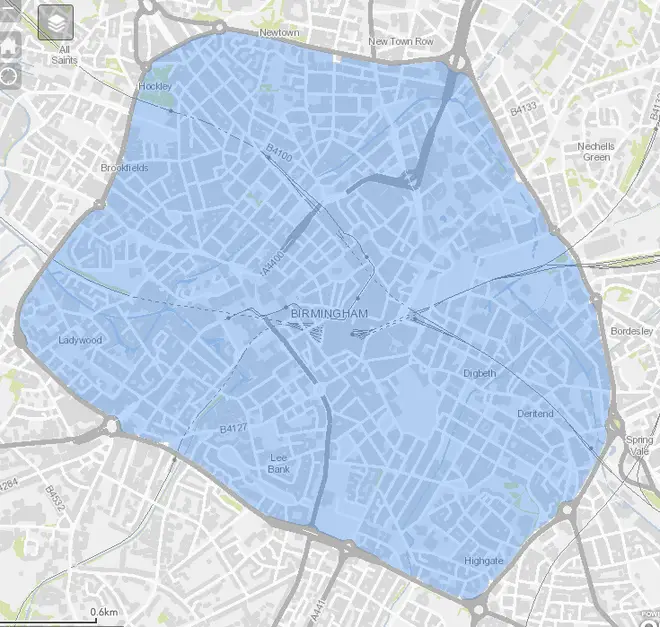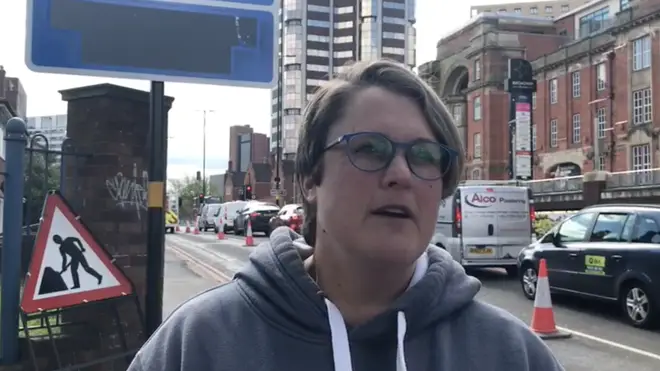
Paul Brand 10am - 12pm
1 June 2021, 09:19 | Updated: 1 June 2021, 09:32

LBC in Birmingham as the Clean Air Zone launches
A Clean Air Zone charging highly-polluting vehicles, including cars, for entering the heart of Birmingham has finally launched - amid claims it will hit many of the city's poorest drivers hardest.
It will see owners of the most high polluting vehicles charged to drive within certain parts of the city centre – different to London’s congestion charge.
Drivers will be charged daily for going into to zone, but despite the scheme launching today, Birmingham City Council have announced drivers won't be charged for another two weeks.
The AA has said the city council-backed Birmingham Clean Air Zone (CAZ) will affect 100,000 vehicle-owners, with the financial burden falling on lower-income and younger drivers.
Birmingham City Council say every year air pollution contributes to the premature deaths of up to 1,000 people in the city through conditions such as cancer, heart and lung disease.
The Government have told them they have to put the CAZ in place as levels of pollution are far too high and NO2 needs to be reduced to a maximum average of 40μg/m3 as soon as possible.

The Zone will cover all roads within the A4540 Middleway Ring Road but not the Ring Road itself. It does include the A38 and tunnels.
It’ll operate 24 hours a day, 365 days a year and charges are daily.
More than 300 signs have been put up to tell drivers they’re approaching the zone and vehicles that do not meet emission standards will be detected by ANPR (Automatic Number Plate Recognition) cameras. Charges are as follows:
A day is midnight to midnight and during that time frame you can come and go from the zone and only be charged once. However, drivers will not get a reminder or notification to say that they’ve entered the zone.
Drivers can pay 6 days in advance and 6 days afterward online or over the phone.
If they don’t pay, they’ll get a £120 fine, reduced to £60 if they paid within 14 days. Some cars are exempt depending on their emission standard.

Councillor Waseem Zaffar has been leading the CAZ project for Birmingham City Council – he told LBC: “There’s a two year exemption if you live in the clean air zone, there’s a one year exemption if you work in the clean air zone and earn less than £30,000.
"Anyone who comes into be vaccinated won’t be charged and the same for anyone coming into the Children’s Hospital."
He added: “This is a challenging policy, there’s no two ways about it but I’m confident with exemptions and financial incentives, that we will support the 25% of drivers of vehicles that are not compliant that currently drive in.
"The old can live safely and longer in our city, the young can grow up healthy and fitter because they’re growing up in a city which is not blighted by health equalities but is blighted where we’ve not got clean air which is a fundamental human right”.
This Clean Air Zone has been brought in because the government told the city council they had to improve air quality in certain places, by law.

Leah Williamson's 6-year-old daughter Lucy has been hospitalised several times with breathing difficulties and she told LBC she thinks the CAZ will make a real difference: “Her breathing has improved a lot over the last year and that’s because there have been fewer vehicles on the roads during lockdown.
"You can see it now, you can see the traffic getting worse – particularly around schools which is so bad for children. I thought living in the city, we’d just have to deal with it but we can make a difference and I feel like having clean air is a human right. We should be able to breathe clean air”.
There is vocal opposition to this zone though.
It's been called a tax on the poor by Labour MP for Perry Barr Khalid Mahmood and unions are calling for more support for people like hospitality workers in the city.
Stuart Richardson from Birmingham TUC told LBC: “It’s still a punitive tax hitting low paid workers. Low paid workers drive older cars, anyone who’s much more wealthy and high paid has new cars and therefore don’t pay. If you’re a low paid worker who has to travel through town to go to work every day, it’ll mean a £2000 bill.
"The key thing is actually developing green infrastructure, free bus services, local car parks as an alternative”.
The city council say they hope to see real reductions in air pollutions due to the CAZ – and are encouraging people to use greener transport methods like public transport and the VOI e-scooter trial currently being run in the city.
The AA is warning that similar plans for London and Bristol could hit 600,000 car owners.
AA president Edmund King said: "Poor air quality is a threat that the majority of drivers agree needs to be addressed and reduced; in due course electric vehicles will largely eradicate those emissions.
"However, the car CAZs in Bristol and Birmingham and the extended Ultra Low Emission Zone in London are very blunt tools that create a tax burden for low-income families and workers."
He added: "These drivers are least able to afford to replace the vehicles they depend on for work, often night shifts, and sometimes emergencies such as going to hospital or healthcare centres.
"They are also the ones least able to pay the fines."
Regional economist Dr Steven McCabe, of Birmingham City University, acknowledged the new CAZ could hit less well-off motorists, and is a "questionable" move during the fallout from the Covid pandemic.
He said: "Though exemptions are possible, anything making life more financially challenging to Birmingham's poorest citizens is unwelcome.
"Launching the CAZ whilst the city is still dealing with the fallout of the global pandemic is questionable, particularly for the retail and the night-time economies in the city centre, Digbeth and the Jewellery Quarter.
"However, a cleaner Birmingham, especially in the city centre, is undoubtedly one that's far more attractive to inhabitants and visitors."